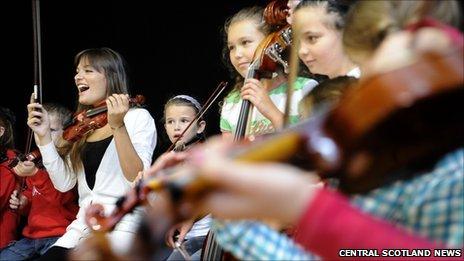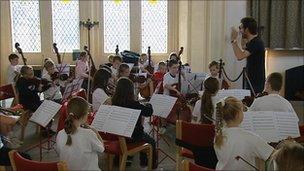Big Noise: 'Saturating' the Raploch estate in music
- Published

The charity says it attempts to remove all barriers to membership of the orchestra
A report has praised the way a children's orchestra is helping to regenerate a run-down estate in Stirling. But how does music turn around people's lives?
Sistema Scotland came to the Raploch in the summer of 2008.
The charity's mission was to transform lives through music - using a model established in Venezuela in 1975.
The estate they chose, on the north west edge of Stirling, was notorious, having long-standing problems with drugs and crime.
George Anderson, communications officer at Sistema Scotland, says the area was picked because it was in the "symbolic" heart of Scotland, "geographically distinct" and easy to reach from all parts of the country.
Sistema's work would also dovetail with Stirling Council's regeneration in the area - including the £17m Raploch Community Campus - providing what he calls the regeneration "for the head".
Mr Anderson says residents on the estate are fed-up with the "blighted" label - preferring instead to look to the future.
'More tolerant'
"People in Raploch are quite forward looking. They don't want to dwell on past things - so we don't," he says.
"The old Raploch is gone."
When the charity started the Big Noise orchestra, Mr Anderson says he only knew of one child on the whole estate who was having music lessons, but now there are more than 300.
And the reaction of parents whose children are involved in the orchestra appears to be universally positive.
One likens the inspiration it provides to the film Billy Elliot. Another says it has made her children "better and more tolerant" because they have been working with others of different religions and abilities.
Some parents say their children can concentrate and focus better, and several say it has had made theirs less aggressive and angry.
But how can music achieve all this?

About 300 children on the estate are now learning a musical instrument
The key is not the music, which Mr Anderson says is just a fortunate by-product of the whole project, but the working together.
"We're generally seen as an arts project - but we're not. We would have used pole vaulting if we thought it would work," he says.
"The orchestra is a place where children can learn to live in a community and co-operate with other.
"An orchestra only works if everyone works together."
All barriers to involvement in the project are removed, with free music lessons and instruments for all.
Children with learning difficulties can take part in the orchestra even if they cannot read traditional music by using a special colour-based notation system.
Adults are also offered music lessons and mini-concerts held in many Raploch homes have "saturated" the whole estate in music, says the charity.
"Early on we realised that some of the parents did not realise how well their children were doing and that some parents did not come to concerts, so we started the project called 'bring a musician home for tea'," says Mr Anderson.
"Everyone wants one now and sometimes half the street turns up to listen."
One man who has observed closely the impact of the Big Noise orchestra on the estate is documentary-maker David Peat.
'Hugely impressed'
He spent the first year of the exercise making a film about it for the BBC.
Mr Peat says that when he first arrived he encountered an estate with "classic" social problems and unemployment, but also people trying to make a decent living.
"I think there was some concern over whether [the orchestra] was a fly-by-night thing," he says.
"But when they saw that they were in there for the long run, people very much got behind it."
Two years later, Mr Peat says he is "hugely impressed" with the progress that has been made.
"This isn't true of all the children, but some of them don't get huge amounts of love and attention at home. But you could see they were getting so much from the music teachers," he says.
"One of the extraordinary things is the voluntary aspect. The kids don't have to go. But I was there last week and I was impressed to see all the same faces two years on.
"It's not an easy thing to learn a string instrument. It takes forever, but they have this long-term vision that in 10 years there will be a youth orchestra. And I think they'll make it."
- Published16 March 2011
- Published14 October 2010
- Published29 July 2010
- Published21 July 2010